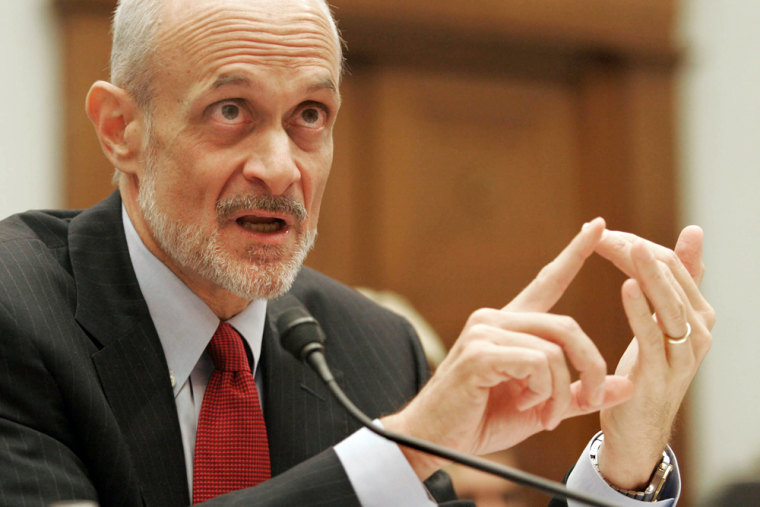President Bush plans to tighten security to protect America's borders. MSNBC Chief Washington Correspondent Norah O'Donnell spoke exclusively with Homeland Security Secretary Michael Chertoff about what the Bush administration is already doing to protect citizens.
Secretary Chertoff says the Homeland Security Department will crack down on businesses that don’t abide by the law.
To read an excerpt of their conversation, continue to the text below.
NORAH O'DONNELL, MSNBC CHIEF WASHINGTON CORRESPONDENT: How many people crossed the border, illegally, in 2005?
MICHAEL CHERTOFF, SECRETARY OF DEPT. HOMELAND SECURITY: Well, it's hard to say. We apprehended 1.1 million illegal immigrants, and how you extrapolate from that in the number that come across is anybody's guess.
O'DONNELL: And what did we do with that, those 1.1 million that crossed?
CHERTOFF: Of course the Mexicans, when we catch them, we return them across the border, and hopefully we catch them when they try to get across again.
A harder problem is the non-Mexicans. We can't just put them back into Mexico. We have to send them back to their home countries and that's given rise to kind of a pernicious policy called "catch and release. People come from third world countries, cross Mexico, come into the U.S. and turn themselves in so they'll get released in the country. We're going to change that. By the end of the fiscal year, we aim to have catch and return for everybody we apprehend at the border.
O'DONNELL: We caught over a million people who had crossed the border illegally. How many of them were terrorists?
CHERTOFF: Assuming that we have a large number of terrorists, I think is a mistake. We do catch people coming across the border who are what we call "special interest aliens".
O'DONNELL: You're telling me that you didn't catch any terrorists in 2005?
CHERTOFF: What I'm saying is we've caught people that we regard as "special interest aliens." I don't think I'd go so far as to say they're terrorists. If you don't control your borders, you don't have security against criminals, you don't have security against terrorists, you don't have security against drugs.
O'DONNELL: In dealing with this problem, is it only an enforcement problem?
CHERTOFF: We're going to have to create a means for people who want to come across to do legitimate temporary work, to do so in a regulated legal channel. That's a temporary worker program that will relieve some of the pressure on our Border Patrol agents
O'DONNELL: Isn't that a fallacy in the argument, to assume they're going to make the money and retire, and then return back to Mexico?
CHERTOFF: We're giving the employers an opportunity to bring themselves within the law and the workers within the law. They don't play by the rules, which means the workers have to go back, then we will punish the employers.
O'DONNELL: There are currently 11 million undocumented workers in the United States. If you had the chance, would you deport every single one of them?
CHERTOFF: I have to say it's just not practical, it's not within the realm of possibility, to round up 8 or 9 million undocumented migrants. So people say, well, let's just deport everybody. I have to say that's a "pie in the sky" attitude.
O'DONNELL: The Minutemen say that the government is doing a horrible job. That they have 15,000 volunteers who are doing the job that the Federal Government should be doing.
CHERTOFF: It would be a big mistake to treat border enforcement as an amateur — an issue for amateurs. People can demonstrate, they can express their point-of-view but when it comes to the hard job of law enforcement, leave it to the professionals.
O'DONNELL: You have taken some equipment off the battlefield that we've used in Afghanistan. Have they been successful?
CHERTOFF: UAVs are a very successful tool. The military's been a great partner, not in doing the actual policing at the border but in providing us with the technology.
ODONNELL: Let's turn to Hurricane Katrina, DHS and FEMA are telling people you have to get out of your hotel by Christmas, is that the right thing to do?
CHERTOFF: The whole key is trying to get people to move on with their lives. We are easing people out, we're encouraging them to leave but at every step of the way there is a safety net. No one is going to be without a safety net.
Watch each night at 5 and 7 p.m. ET on MSNBC.
